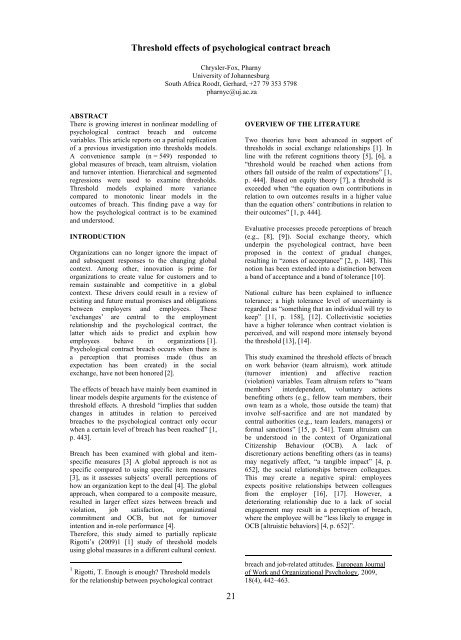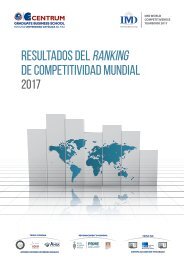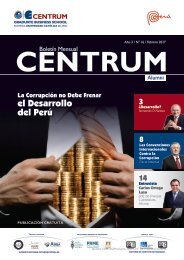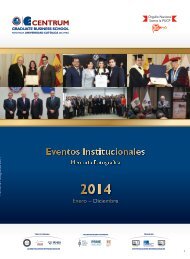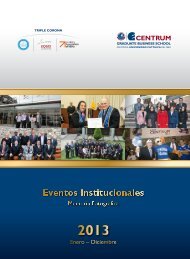Pan-Pacific Conference XXXIV. Designing New Business Models in Developing Economies
This publication represents the Proceedings of the 34th Annual Pan-Pacific Conference being held in Lima, Peru May 29-31, 2017. The Pan-Pacific Conference has served as an important forum for the exchange of ideas and information for promoting understanding and cooperation among the peoples of the world since 1984. Last year, we had a memorable conference in Miri, Malaysia, in cooperation with Curtin University Sarawak, under the theme of “Building a Smart Society through Innovation and Co-creation.” Professor Pauline Ho served as Chair of the Local Organizing Committee, with strong leadership support of Pro Vice-Chancellor Professor Jim Mienczakowski and Dean Jonathan Winterton.
This publication represents the Proceedings of the 34th Annual Pan-Pacific Conference being held in Lima, Peru May 29-31, 2017. The Pan-Pacific Conference has served as an important forum for the exchange of ideas and information for promoting understanding and cooperation among the peoples of the world since 1984. Last year, we had a memorable conference in Miri, Malaysia, in cooperation with Curtin University Sarawak, under the theme of “Building a Smart Society through Innovation and Co-creation.” Professor Pauline Ho served as Chair of the Local Organizing Committee, with strong leadership support of Pro Vice-Chancellor Professor Jim Mienczakowski and Dean Jonathan Winterton.
Create successful ePaper yourself
Turn your PDF publications into a flip-book with our unique Google optimized e-Paper software.
Threshold effects of psychological contract breach<br />
Chrysler-Fox, Pharny<br />
University of Johannesburg<br />
South Africa Roodt, Gerhard, +27 79 353 5798<br />
pharnyc@uj.ac.za<br />
ABSTRACT<br />
There is grow<strong>in</strong>g <strong>in</strong>terest <strong>in</strong> nonl<strong>in</strong>ear modell<strong>in</strong>g of<br />
psychological contract breach and outcome<br />
variables. This article reports on a partial replication<br />
of a previous <strong>in</strong>vestigation <strong>in</strong>to thresholds models.<br />
A convenience sample (n = 549) responded to<br />
global measures of breach, team altruism, violation<br />
and turnover <strong>in</strong>tention. Hierarchical and segmented<br />
regressions were used to exam<strong>in</strong>e thresholds.<br />
Threshold models expla<strong>in</strong>ed more variance<br />
compared to monotonic l<strong>in</strong>ear models <strong>in</strong> the<br />
outcomes of breach. This f<strong>in</strong>d<strong>in</strong>g pave a way for<br />
how the psychological contract is to be exam<strong>in</strong>ed<br />
and understood.<br />
INTRODUCTION<br />
Organizations can no longer ignore the impact of<br />
and subsequent responses to the chang<strong>in</strong>g global<br />
context. Among other, <strong>in</strong>novation is prime for<br />
organizations to create value for customers and to<br />
rema<strong>in</strong> susta<strong>in</strong>able and competitive <strong>in</strong> a global<br />
context. These drivers could result <strong>in</strong> a review of<br />
exist<strong>in</strong>g and future mutual promises and obligations<br />
between employers and employees. These<br />
‘exchanges’ are central to the employment<br />
relationship and the psychological contract, the<br />
latter which aids to predict and expla<strong>in</strong> how<br />
employees behave <strong>in</strong> organizations [1].<br />
Psychological contract breach occurs when there is<br />
a perception that promises made (thus an<br />
expectation has been created) <strong>in</strong> the social<br />
exchange, have not been honored [2].<br />
The effects of breach have ma<strong>in</strong>ly been exam<strong>in</strong>ed <strong>in</strong><br />
l<strong>in</strong>ear models despite arguments for the existence of<br />
threshold effects. A threshold “implies that sudden<br />
changes <strong>in</strong> attitudes <strong>in</strong> relation to perceived<br />
breaches to the psychological contract only occur<br />
when a certa<strong>in</strong> level of breach has been reached” [1,<br />
p. 443].<br />
Breach has been exam<strong>in</strong>ed with global and itemspecific<br />
measures [3] A global approach is not as<br />
specific compared to us<strong>in</strong>g specific item measures<br />
[3], as it assesses subjects’ overall perceptions of<br />
how an organization kept to the deal [4]. The global<br />
approach, when compared to a composite measure,<br />
resulted <strong>in</strong> larger effect sizes between breach and<br />
violation, job satisfaction, organizational<br />
commitment and OCB, but not for turnover<br />
<strong>in</strong>tention and <strong>in</strong>-role performance [4].<br />
Therefore, this study aimed to partially replicate<br />
Rigotti’s (2009)1 [1] study of threshold models<br />
us<strong>in</strong>g global measures <strong>in</strong> a different cultural context.<br />
1 Rigotti, T. Enough is enough? Threshold models<br />
for the relationship between psychological contract<br />
21<br />
OVERVIEW OF THE LITERATURE<br />
Two theories have been advanced <strong>in</strong> support of<br />
thresholds <strong>in</strong> social exchange relationships [1]. In<br />
l<strong>in</strong>e with the referent cognitions theory [5], [6], a<br />
“threshold would be reached when actions from<br />
others fall outside of the realm of expectations” [1,<br />
p. 444]. Based on equity theory [7], a threshold is<br />
exceeded when “the equation own contributions <strong>in</strong><br />
relation to own outcomes results <strong>in</strong> a higher value<br />
than the equation others’ contributions <strong>in</strong> relation to<br />
their outcomes” [1, p. 444].<br />
Evaluative processes precede perceptions of breach<br />
(e.g., [8], [9]). Social exchange theory, which<br />
underp<strong>in</strong> the psychological contract, have been<br />
proposed <strong>in</strong> the context of gradual changes,<br />
result<strong>in</strong>g <strong>in</strong> “zones of acceptance” [2, p. 148]. This<br />
notion has been extended <strong>in</strong>to a dist<strong>in</strong>ction between<br />
a band of acceptance and a band of tolerance [10].<br />
National culture has been expla<strong>in</strong>ed to <strong>in</strong>fluence<br />
tolerance; a high tolerance level of uncerta<strong>in</strong>ty is<br />
regarded as “someth<strong>in</strong>g that an <strong>in</strong>dividual will try to<br />
keep” [11, p. 158], [12]. Collectivistic societies<br />
have a higher tolerance when contract violation is<br />
perceived, and will respond more <strong>in</strong>tensely beyond<br />
the threshold [13], [14].<br />
This study exam<strong>in</strong>ed the threshold effects of breach<br />
on work behavior (team altruism), work attitude<br />
(turnover <strong>in</strong>tention) and affective reaction<br />
(violation) variables. Team altruism refers to “team<br />
members’ <strong>in</strong>terdependent, voluntary actions<br />
benefit<strong>in</strong>g others (e.g., fellow team members, their<br />
own team as a whole, those outside the team) that<br />
<strong>in</strong>volve self-sacrifice and are not mandated by<br />
central authorities (e.g., team leaders, managers) or<br />
formal sanctions” [15, p. 541]. Team altruism can<br />
be understood <strong>in</strong> the context of Organizational<br />
Citizenship Behaviour (OCB). A lack of<br />
discretionary actions benefit<strong>in</strong>g others (as <strong>in</strong> teams)<br />
may negatively affect, “a tangible impact” [4, p.<br />
652], the social relationships between colleagues.<br />
This may create a negative spiral: employees<br />
expects positive relationships between colleagues<br />
from the employer [16], [17]. However, a<br />
deteriorat<strong>in</strong>g relationship due to a lack of social<br />
engagement may result <strong>in</strong> a perception of breach,<br />
where the employee will be “less likely to engage <strong>in</strong><br />
OCB [altruistic behaviors] [4, p. 652]”.<br />
breach and job-related attitudes. European Journal<br />
of Work and Organizational Psychology, 2009,<br />
18(4), 442–463.


